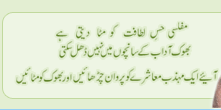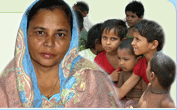|
blog by: siyasidhairiyay
In a country of 180 million people, how much importance is attached to the single individual? Attempt in your own way to grapple with this question: can an individual become an institution? How much does one human being count for in the entirety and cacophony of a diverse nation? All too often, the news is a sobering reminder of the downward trajectory Pakistan, achieved with the supreme sacrifice of blood and initially conceived as a dream, has been undergoing especially in the wake of the Afghan war. The heart does not find rest, always remains perturbed and restless. Then, in the midst of all the violence and the tension, the target killings and power outages, there emerges that one light, a reason to believe. Hope flickers through in that one moment of salvation.
In a poor locality in Karachi called Khuda Ki Basti, a lady by the name of Parveen Saeed, a resident of Surjani town, has embarked on something extra-ordinary; exceptional not because of the size and scale of her project or her administrative prowess, or for that matter, the number of people whose lives she is able to touch. Parveen Saeed is special because she is humane, because she understands human suffering, and in this case, the pangs of hunger and the horrible reality of poverty. Parveen Saeed is able to internalize the suffering of a mother who choked two of her children because she could not feed them. Many of us are able to de-sensitive ourselves from such occurrences. Parveen Saeed could not. The brutal nature of destitution rings powerfully in the words of Victor Hugo, “ I’m a man who… what’s the word for it? I’m one of those people who doesn’t eat every day. I’m… I’m hungry, that’s the word”.
She began to work, bound by financial constraints, and curtailed by her own middle class orientation. Khana Ghar expanded slowly on the bank on donations from family and friends. Now after a decade, she feeds 2000 people daily, charging RS 3 per meal. Interestingly, the money she charges is to make the customers realize that they have earned their food. In this manner, she protects their dignity and self-respect. Dreams do materialize.
Why is the example of Parveen Saeed important? What lessons can the reader extract from this blog? Put simply, the case of an ordinary women effecting change in her locality through a decade long struggle, through her own effort, should speak out to those who remain indolent and apathetic, those who stockpile blame on others, their parents, their siblings, their leaders. Yes, the leaders are corrupt; the economy is in bad shape, terrorism is rampant and jobs are scarce. Conditions are not ideal by any yardstick. But how are you, as an individual, in your own capacity, trying to make a difference? Instead of bickering endlessly about how hopeless the country is, do understand that you have a contribution, however minor, to the present state of affairs. The solution too, however painstaking and timely, lies within your grasp. We would all be amazed how much social change we could engineer through a concerted effort on the part of every individual to improve himself or herself; volunteer to clean the roads, educated a child, or simply, feed a hungry man. Look how far Parveen Saeed has come. In the timeless words of Iqbal, Khudi ko kar buland itnake har taqder se pehleKhuda bande se khud pooche bata teri raza kya hai(“Elevate yourself so high that even God, before issuing every decree of destiny, should ask you: Tell me, what is your intent?”).
[source: http://siyasidhairiyay.wordpress.com/2013/04/20/feeding-the-destitute-in-karachi-a-case-study-of-khana-ghar]
|



